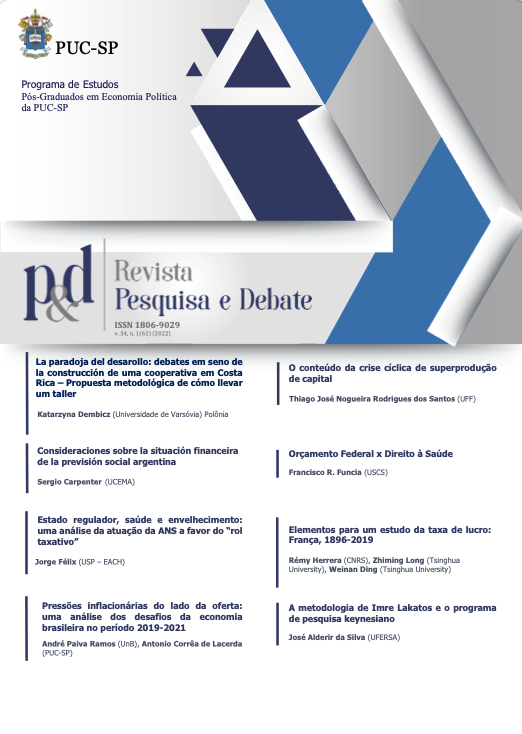La paradoja del desarollo: debates en el seno de la construcción de una cooperativa en Costa Rica
Propuesta metodológica de cómo llevar un taller
DOI:
https://doi.org/10.23925/1806-9029.v34i1e60234Palavras-chave:
cooperativismo, desarollo, pensamiento crítico, imaginários, Costa Rica, tallerResumo
El presente trabajo hace constancia del modo de percibir el “desarrollo” y “buena vida” por los miembros del cooperativismo costarricense, en base a cuatro estudios de caso en localidades La Cruz, Ciudad Neily, Buenos Aires y San Vito. Esta interesante experiencia nos impulsó a crear una propuesta de taller, que pudiera ser utilizado como herramienta en el proceso de creación de una cooperativa y/o a lo largo de su funcionamiento, con el fin de disminuir los riesgos de desentendimiento entre sus miembros, en el caso de decidir sobre los objetivos o derroteros de su actividad.
El cooperativismo, elemento de la economía social, es un eje de las propuestas alternativas al desarrollo y de desarrollo alternativo. Por lo tanto, estoy convencida que en el seno de estas entidades debería haber espacio para discutir sobre temas tan importantes.
Al mismo tiempo, el presente estudio forma parte de un proyecto más amplio financiado por el Centro Nacional de Ciencia de Polonia (no. 2018/29/B/ HS6/00187) titulado “Discourses and development dilemmas of Central American local communities”, en el marco delcual se realizó un trabajo de campo en el mes de enero 2021 y una serie de debates virtuales donde las diferentes perspectivas sobre el desarrollo en el contexto de la construcción de megaproyectos fueron analizados.
Referências
Acosta A. (2014) “El buen vivir, más allá del desarrollo” en: Delgado, Gian Carlo (Ed.) Buena Vida, Buen Vivir: imaginarios alternativos para el bien común de la humanidad, México: Centro de Investigaciones Interdisciplinarias en Ciencias y Humanidades, Universidad Nacional Autónoma de México, p. 21-60, http://biblioteca.clacso.edu.ar/Mexico/ceiich-unam/20170503034423/pdf_1508.pdf (acceso: 20.06.2021)
Avila Romero L.E. (2020) Alternativas al colapso socioambiental desde América Latina, Guadalaja, México: CALAS
Boisier S. (2006) América Latina en un medio siglo (1950/2000): el desarrollo, ¿donde estuvo?, Investigaciones Regionales, núm. 9, otoño, 2006, pp. 145-167.
Cruz Barrios et al. (2015) La concepción de la vida deseable de los pueblos indígenas y las comunidades étnicas de Nicaragua. Nº 3. Nahoas. El buen vivir nahoa en la comunidad de urbaite – las pilas. Managua: Universidad Nacional Autónoma de Nicaragua.
Dembicz K. (2019). „Discourses and Development Dilemmas of Central American Local Communities: Research Project Presentation” w: La metrópoli de Simón Bolívar. Centroamérica y el Caribe en disputa. Barboza Lizano O., Dantas A. & Dembicz K. (Ed.) Chile: Ariadna Ediciones. ISBN: 978-956-8416-84-3, pp. 115-133.
Hidalgo-Capitán, Antonio Luis & Ana Patricia Cubillo-Guevara (2016) Transmodernidad y transdesarrollo, Huelva: Ediciones Bonanza.
INEC – Instituto Nacional de Estadística y Censos, https://www.inec.cr/social/grupos-etnicos-raciales (acceso: 3.07.2021)
Li Bonilla F. (2018) Doctrina y Cooperativa Social, San José: Editorial EUNED
Li Bonilla (2013) El modelo cooperativo costarricense, Costa Rica: EUNED.
Lofland J., Snow D., Andreson L. y Lyn Lofland (2009) Analiza układów społecznych. Przewodnik metodologiczny po badaniach jakościowych, Warszawa: SCHOLAR.
Malinowski B. (1986) Los argonautas del Pacífico occidental, Barcelona: Planeta-Agostini
Olszewska-Dyoniziak (2003) Człowiek – kultura – osobowość. Wstęp do klasycznej antropolofii kulturowej. Wrocław: ATLA 2
Ovejero, A. (1993) La teoria de la disonancia cognoscitiva, Psicothema, vol. 5, núm. 1, 1993, pp. 201-206, https://www.redalyc.org/pdf/727/72705116.pdf
Gregorio Vidal (2001) Celso Furtado y el problema del desarrollo, Comercio Exterior, vol. 51, núm. 2, México, febrero de 2001, tomado de: http://www.centrocelsofurtado.org.br/arquivos/image/201108311544020.VIDAL_CF_Y_EL_PROBLEMA_DEL_DESARROLLO.pdf (acceso: 19.07.2021)
Downloads
Publicado
Como Citar
Edição
Seção
Licença
Copyright (c) 2022 Pesquisa & Debate

Este trabalho está licenciado sob uma licença Creative Commons Attribution 4.0 International License.


